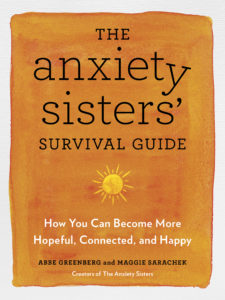Anxiety and Being Kind to Yourself
How self-compassion can help parents (and anyone else) manage anxiety
en EspañolThis is an excerpt from The Anxiety Sisters Survival Guide: How You Can Become More Hopeful, Connected, and Happy, by Abbe Greenberg and Maggie Sarachek.
When we say, “Be kind,” we’re not talking about being nice to others (although that’s always a good idea); we’re talking about being kind to yourself. This is no easy task — we are often much quicker to be kind to everyone else but ourselves. Recognizing this, Kristin Neff, a researcher and professor at the University of Texas at Austin (and with whom we were fortunate enough to have trained), developed the concept of self-compassion, which is giving ourselves the same kindness and understanding we would offer a friend who is experiencing difficulty.
Typically, when we’re having a hard time, we tend to beat ourselves up about it. Our inner critics are all too eager to remind us how we’ve failed (once again):
I feel like a terrible person because I always blow up at my kids when I’m anxious. I let the worst parts of me take over. (Gillian, age 44)
I really want to visit my son, but I am too afraid to make the drive. I feel like such a failure. (Reyna, age 55)
Self-compassion is all about turning our inner critics into our inner advocates. Instead of reprimanding ourselves, self-compassion suggests we offer ourselves unconditional acceptance and supportive self- talk. For example, we can practice self- compassion by saying something like: “Anxiety is a real struggle for me, and this has been really painful.”
Self-compassion, as conceptualized by Dr. Neff, comprises three components: (1) self- kindness, (2) common humanity, and (3) mindfulness. We’ve already covered self-kindness, which is all about treating yourself gently and compassionately, as you would a good friend. Common humanity is the understanding that we all struggle with challenges and that none of us live a life without pain. Suffering is part of what it means to be human — nobody gets out unscathed. When we truly accept our common humanity, we realize how connected we all are. Our trials are not unique, and we are not alone.
Self-compassion, then, allows us to transform a sense of isolation into connectedness when we are suffering. Common humanity is such a valuable notion because we all know how lonely it is to live with an anxiety disorder.
I thought I was the only one who had trouble leaving the house. I was so embarrassed about it — I wouldn’t talk about my anxiety with anyone. When I learned that agoraphobia was an actual thing, and that other people had it too, it was like the weight of the world was lifted off me. (Natalie, age 63)
The root of self-compassion is mindfulness, which is defined as being completely open to whatever it is you are feeling or thinking in a given moment. Many of us are uncomfortable sitting with our emotions because we are scared they will swallow us whole. Mindfulness teaches us not to push away or try to suppress our emotions.
Another aspect of mindfulness is recognizing that your thoughts and feelings are not a permanent state — that they too will pass. Understanding the transient nature of thoughts and emotions helps us stay off the hamster wheel of exaggeration — when your mind goes right to “This is the worst thing ever” or “I’ll never feel better.” If we believe that no emotional state lasts forever, then we are better able to tolerate pain and suffering. Once we can tolerate our pain and suffering (by using self-compassion), we can proceed to soothe ourselves.
Self-compassion is not only about making yourself feel better. It’s also about empowering yourself to take action. When we aren’t caught up in the denial spiral or stuck on the exaggeration hamster wheel, we free up our rational brain to help us problem-solve. For science wonks, the limbic system is calmed, the prefrontal cortex can be engaged.
In terms of motivation to change behavior, self-compassion is a far better choice than self-criticism, which releases stress hormones and lowers resilience. How has berating yourself helped you manage your anxiety? We’re guessing not so well. Self-compassion allows you to be less afraid of failure and judgment, which results in your being better able to take risks.
Studies show that self-compassion makes us less self-indulgent, more accountable, and more likely to change our behavior. It also makes us more resilient. But most important for us, research shows that self-compassion is correlated with decreased anxiety and depression.
So how can we use self-compassion to manage our anxiety? As we said earlier, we start by talking very gently to ourselves and disengaging our inner critics. If you catch yourself thinking, “I’m a total mess,” try: “Anxiety is part of the human experience, and sometimes it feels messy.” Replace “Things will never get better” with: “I’m suffering right now, but I won’t always feel this way.”
After you have silenced your inner critic and given yourself some compassion, you can then ask yourself, “What do I need right now?” In other words, do you need to be alone? With others? An action plan? A hug? A bath? A walk? Do you need to enlist other resources, like a therapist or the advice of a close friend?
Finally, remind yourself that everyone experiences suffering — that what you are going through is valid and very human. Give yourself permission to feel anxious, because all humans feel anxious sometimes; then, with the love and compassion you absolutely deserve, tell yourself you will be okay.
Excerpted from THE ANXIETY SISTERS’ SURVIVAL GUIDE, by Abbe Greenberg and Maggie Sarachek, published by TarcherPerigee, an imprint of Penguin Publishing Group, a division of Penguin Random House, LLC. Copyright © 2021 by Anxiety Sisters, LLC.

